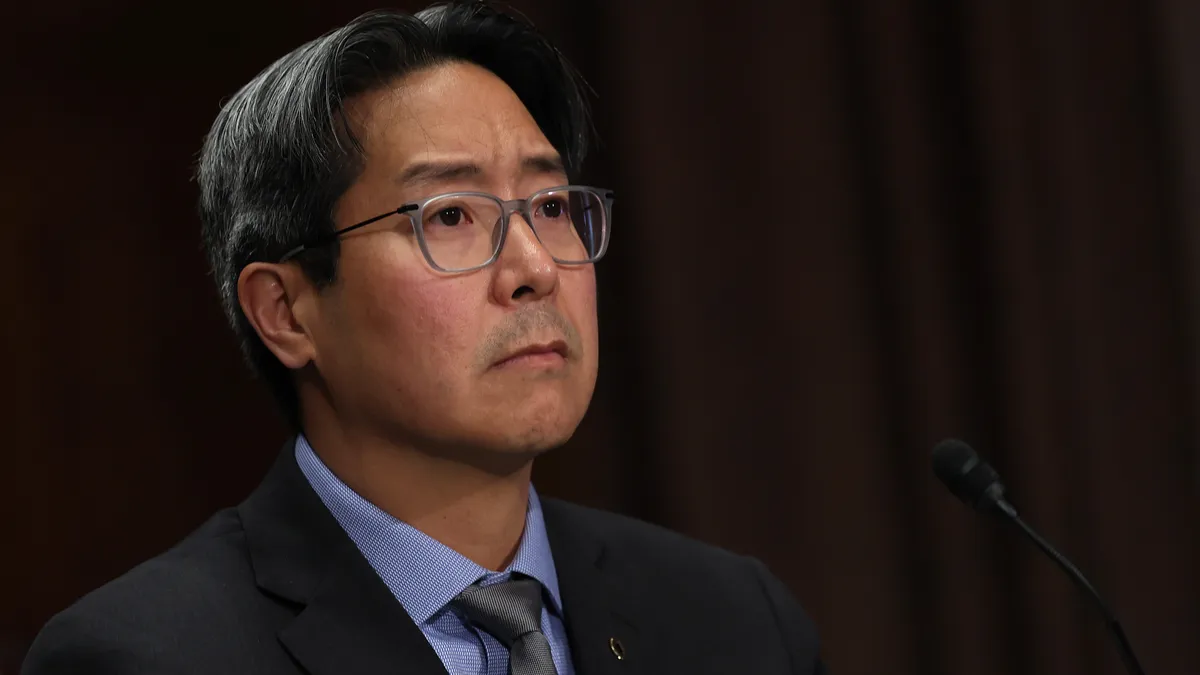Dive Brief:
- Following a recent Supreme Court decision, the Office of the Comptroller of the Currency plans to “fortify and vigorously defend core preemption,” Acting Comptroller Michael Hsu said Wednesday.
- At the same time, the OCC will assess its preemption regulations “to determine whether updates are needed in light of the recent Cantero decision,” Hsu said. Cantero v. Bank of America addressed whether a national bank has to abide by a state law, and the Supreme Court’s decision directs lower courts to conduct deeper analysis and consider precedent when it comes to national bank preemption of state laws.
- Hsu also noted the growth of large banks in recent years and pointed to the need for heightened regulation for banks that have grown bigger and more complex; and the rising complexity of bank-nonbank ties, which he said are blurring the lines between banking and commerce.
Dive Insight:
Strengthening the OCC’s core preemption powers “will provide certainty where it matters the most — i.e., with regards to safety and soundness and compliance with federal laws and regulations,” Hsu said. In those areas, preemption “is legally absolute and non-negotiable, and the OCC will act accordingly to defend that.”
But the agency needs to develop “a more nuanced and balanced approach” to Barnett, the legal standard for evaluating preemption of state laws, Hsu said. Updating the OCC’s 2020 interpretation of preemption under the Dodd-Frank Act “could be a helpful step toward that,” he said.
“The combination of vigorously defending core preemption, while being more precise in defining and applying the Barnett standard, will sharpen the OCC’s preemption powers,” Hsu said. “Preemption is in our DNA — an attribute that will be sharpened as we pivot from expanding preemption to fortifying it.”
Meg Tahyar, a partner and head of the financial institutions practice at law firm Davis Polk, said she expects the agency to review its preemption standards thoughtfully. Noting the OCC’s Civil War-era creation to oversee a system of national banks, Hsu called out the danger of a fragmented market, and underscored that there’s plenty at stake.
“I think what he’s trying to do is to chart a path for the 21st century,” Tahyar said. “He’s saying we are going to review, but keep in mind why we have this legal principle that is designed to create a national market.”
Hsu’s comments suggest the OCC’s preemption rules following Dodd-Frank can’t really be relied on anymore, said Alexandra Steinberg Barrage, a partner at law firm Troutman Pepper and former executive at the Federal Deposit Insurance Corp. “The OCC has now said, ‘We have some work to do there,’” she said.
Cantero has significant implications, both for how banks think about state consumer financial laws, and how they’ll now look at OCC preemption rules, which will potentially be revisited, Barrage said. “But it’s also important for states, because it’ll inform how states understand national bank preemption,” she added.
“All of that points to more litigation. Less certainty. No real bright lines,” she said. “And instead of having two parties, which is the OCC and the national bank, now we have courts,” which leads into Hsu’s frustration evident in the speech, she said.
In his speech, Hsu also noted the shift over time from direct banking relationships to the increasingly complex web of parties involved in providing banking services. “Banking, in short, is beginning to resemble global manufacturing supply chains,” he said.
That can create risk, he said, pointing to the recent bankruptcy of fintech middleman Synapse. That event has shown “the line between where a bank ends and where a nonbank begins is increasingly hard for consumers, regulators, and market participants to discern,” Hsu said.
The proliferation of bank-nonbank arrangements underscores a need “for more granular approaches” and more engagement between federal banking agencies and nonbank fintechs, Hsu said. Exploring in more detail the potential risks of those arrangements is a priority, he added.












